- Home
- Alison Booth
The Indigo Sky Page 8
The Indigo Sky Read online
Page 8
‘How recently?’
‘Any time over the past year.’
‘That’s a long time. Not a close friend then. What was the name?’
‘Tommy or Molly Hunter.’
‘Tommy or Molly. Not both?’
‘No.’
‘You’ll need to be a bit more specific than that. You need to know which. But anyway I can’t release that sort of confidential information, not unless you’re family.’
‘The Hunters are Aborigines.’
‘I see,’ the woman said, inspecting Ilona more closely. ‘Not relatives then, I suppose. Your accent isn’t from around here anyway, is it? New Australian, aren’t you? Don’t get many of those around here, though there are plenty up Cooma way with the Hydro scheme.’
‘I’ve been here for years. Mrs Vincent’s the name.’ She wasn’t going to expose her first name to be judged by this woman. ‘The Hunters are missing and no one knows where they are.’
‘Well, you should go to the police for missing persons, not the hospital. Report it there and they’ll let you know. But the Abos are always going missing. A shiftless lot. Walkabout, they call it. Not working for you, are they?’
‘No. They’re friends.’
‘I see. Well, try the police station, dear. There’s nothing more I can do to help.’ With that, the woman went back to her paperwork.
Back at the car, Ilona kicked the front tyre hard to vent her frustration.
‘Glad that’s not me you’re kicking, love.’
So irritated was she by her encounter that she hadn’t noticed the burly young man weeding the garden bed next to the car. ‘I’m glad too,’ she said. ‘You look as if you could give a pretty hard kick back.’
‘Never to the ladies,’ he said, grinning. ‘You’ve got a bit of style there, but. Maybe we should sign you up to the local footie team.’
‘I’ll bear that in mind,’ she said, managing a laugh. ‘I’ll be turning up next season for the trials.’
On the drive back to Jingera, she thought about the morning’s encounters. The police wouldn’t be the slightest bit interested in the Hunters, she knew. The Aborigines were people to be moved on, people to be shunted out of town by six o’clock unless they had a piece of paper to show they were deserving. People to be avoided, or to be locked up if you couldn’t do that.
Tracking down the Hunters wasn’t going to be easy. Her hopes of finding Lorna’s family before Christmas were beginning to evaporate.
Chapter 11
The following morning, Jim hung around with Andy at the edge of the lagoon, hoping Hairy Harry would turn up so they could hire a canoe. Eventually, one of the O’Rourke tribe, heading towards the footbridge over the lagoon, said he’d seen Harry having a liquid lunch at the pub. That was when they decided to give up. Andy didn’t want to surf and Jim didn’t want to swim in the lagoon, so they mooched around, kicking a rock up and down the street. There was no one around, although most of the summer cottages were let out. Everyone must be on the beach; there was certainly a small forest of beach umbrellas planted on the sand, and stick-like figures darted in and out of the waves.
At that moment Andy kicked the rock so hard that it clanged against the hub cap of a car parked a few yards away. Immediately a cottage door opened, and a man in singlet and shorts came out.
‘You throwing rocks at my car?’
‘No, it just accidentally hit the tyre. Sorry. No damage done.’ Andy smiled in that ingratiating way of his and removed his canvas hat as if paying his respects. Thickened by salt from an early morning swim, his sun-bleached hair stood up like straw. Jim, not yet used to his younger brother being almost the same height as he was, noticed for the first time that his skinny limbs looked oddly stretched and out of proportion to his knobbly joints.
Singlet man was unaffected by Andy’s winning smile and doffed hat. After inspecting the hub caps, he walked around his car again, checking the duco. ‘You’d better kick your stone somewhere else,’ he said finally.
‘Sure thing.’ Andy picked up the rock and he and Jim strolled up the hill. Thirty yards on, Andy turned around. Singlet man was still watching.
‘Don’t do it,’ Jim warned.
He was too late. Andy’s arm circled so quickly it formed a disc in the air and the rock shot forward. At the same moment there was a resounding ping from the metal sign forbidding speedboats. ‘Out for a duck, I reckon,’ Andy said, grinning. ‘Got to keep up the cricket practice, even though it’s not term time.’
‘You’re looking for trouble, Andy. Lucky you didn’t get a canoe or a car.’
‘Nah. Just can’t resist a good target.’
‘Or an audience.’
They wandered up the hill, and followed the road leading up to the headland. The primary school had in front of it a freshly painted sign, Jingera Public School, Established 1890. A new row of trees, shrouded in plastic against the children and the winter winds, stood sentinel around the edge of the playground. Although the former school mistress, Miss Neville, had moved to Sydney at the same time as Jim, to him she would be forever associated with this building. He’d visited her in Sydney a few times, even stayed with her for one of his free weekends, in the terrace house she shared with Mrs Bates. He owed his Stambroke College scholarship to her. Without her efforts he would never have sat for the exam, and never have topped it either.
Now Jim and Andy wandered across to the far side of the cemetery on the top of the headland. Beyond the white painted fence bordering the graveyard, a narrow track led under twisted shrubs and along the cliff edge, before dropping to a ledge below. The ocean was spread out in front of them.
Jim took off his hat and massaged his head. The slight headache he’d woken up with that morning had almost completely gone. This was the second day of the school holidays and the second morning he’d slept in until nine o’clock. He might have slept in even longer if his mother hadn’t routed him out.
Andy now pulled a crumpled packet of cigarettes out of the pocket of his shorts and lit one. He sucked hard at it and afterwards coughed so much that Jim had to bang him on the back.
‘How long have you been smoking these things? Mum will kill you if she finds out. Dad too.’ Jim had to speak loudly to be heard above the breakers crashing onto the rocks below them.
‘She won’t find out. Dad wouldn’t mind, he’s smoked a fair few in his time. Anyway, he never notices anything I do. He’s only interested in what you do. I could fall off this cliff or win the lottery or be selected to play for Australia in the Ashes and he wouldn’t bat an eyelid. He’d just pat me on the back and say “Well done, son,” and carry on with whatever he was up to.’
Jim knew there was some legitimacy to this, but said, ‘He was really proud of your woodwork prize. He talked about that for ages on the train trip home.’ This was untrue, he’d mentioned it briefly once. Jim hadn’t wanted to enquire about it because he knew the table was to be a Christmas present.
‘He didn’t even ask me what I’d made. After I told him I’d come top, out came the standard response. “Well done, son” without even a question about what it was. Don’t you think he’d be curious about that, even if he does think I’m not that bright? You’d think he’d want to encourage me to do something I’m good at. And it’s a beautiful table.’ Andy stubbed out his cigarette and stared gloomily out to sea.
Jim hadn’t seen the table yet. Mr Blake, the woodwork teacher at Burford Boys’ High, had agreed to mind it for Andy until closer to Christmas. He said, ‘Dad’s proud of the shed. That was a terrific idea of yours, to open up one wall and put the telescope on rails. He’d never have thought of that on his own and neither would I. And he uses it all the time. Mum told me that every clear night, he’s out there in the garden, pushing the telescope up and down the track.’
Andy’s face took on a ten
der look. ‘Staring at the night sky,’ he said. ‘It doesn’t take much to make the old man happy, Jim. I’d do anything to get him to smile but he just doesn’t seem to notice me. He was pleased about the shed and that made me glad, but he didn’t give me much credit for it. It’s as if anything I do or say he discounts because I’ve done it and not you. He just doesn’t think much of me, never has. And I won’t be able to change that, no matter what.’
After a while, Andy continued. ‘I want to leave Burford High, Jim. I can’t take it anymore. It’s not just Dad, it’s everything. I feel so shut in here, and I’m not much good at lessons. One of the teachers told me about the Army Apprentices’ scheme. He reckons I could get in. They take you at the minimum school-leaving age, that’s fourteen. I sent off for some information last week. Carpentry and joinery, that’s what I’d really like to do.’
‘In the army, though?’
‘Yeah, why not? They cover all the trades. I’d join the army to do my apprenticeship, and then I’d serve it out for a few years.’
‘How long?’
‘Nine years altogether.’
‘That’s a long time, Andy. Mum would hate it.’
‘Dad wouldn’t though. He served in the war, don’t forget. He’d be really proud of me.’
‘Does he know?’
‘Not yet.’
Jim chewed his thumbnail while he thought this over. It wasn’t just that Andy needed to get away, he wanted to do something his father approved of too. Their father sometimes talked about the war as if his time in the army in the Northern Territory had been a great adventure, yet that wouldn’t necessarily mean he’d want his son to join up. Joining the army certainly made sense twenty years ago when the Germans were rattling around Europe and the Japanese threatening Australia and the Pacific, but it didn’t seem to now. Jim remembered the Communist threat that was reported in the newspapers. ‘What if there’s another war?’ he said.
‘Unlikely. Anyway, if there is I’ll see a bit of the world. And it’s not like I’d be carrying a gun. Only a hammer and chisel.’ He laughed.
‘Or a hammer and sickle, that’s the Communist flag. I’m not sure about this, Andy. Melbourne’s a long way away.’
‘So is Sydney, Jimmo, and it doesn’t bother you.’
‘But it’s in the opposite direction.’
‘I know, but what else can I do? An apprenticeship in Burford? What’s the future in that? Anyway Mum thinks I should stay on at Burford High rather than go to the Tech there. It’s not much good, she says. And if I did go there, she’d worry about money because my apprenticeship wages wouldn’t cover my board, but the Army Apprentices’ scheme pays wages and board. It would be beaut, Jimmo. Just like you at boarding school.’
For an instant Jim wished this had all been decided before he came home. There could be rows all through the holidays once Andy mentioned it, just like all those arguments between his parents when he’d sat for the scholarship and afterwards. But he was being selfish. This probably was the right choice for Andy to make.
Yet a void began to open up inside him as he realised that this could well be the last summer they would spend together. He gazed at the four headlands to the north, layered like cardboard cut-outs and receding into a distant haze from which Mount Dromedary rose. He’d thought he would be the first to leave Jingera permanently and that Andy would always be here. Not just next year and the years after but right into the future: Cadwallader and Son, Quality Meats. There was continuity there.
Though now he thought of it, there’d never been any mention of such a venture and he couldn’t imagine his father and Andy working together. It had been an assumption that he’d made about Andy’s future and it had been wrong. He wondered how many other assumptions he’d been making that he didn’t even notice, let alone question. That Jingera was the best place in the world? That he’d be Dux of Stambroke next year? That Andy didn’t resent his successes?
Chapter 12
‘Don’t slam the car door!’ Ilona called to Zidra, but it was too late.
‘Need to tell her before, not after,’ Peter said, flinching slightly.
‘Sorry, Ma.’ Zidra grinned through the car window and adjusted her sunhat. She had a striped beach bag slung over one shoulder and a patch of white zinc cream on her nose that Ilona felt sure would be wiped off as soon as she was out of sight.
Sally Hargreaves was already waiting near the post office. ‘Isn’t it a lovely day!’ she said. ‘Hairy Harry’s renting his canoes this morning, so I thought we could take one out.’
‘I’ll need some extra money, Mama,’ said Zidra.
Ilona dug into her handbag to find a few coins. ‘See you at four, Zidra,’ she said. ‘And don’t go wandering off if we’re a bit late back.’
‘Give my love to the Chapmans and Mrs Jones,’ Zidra called. Mrs Jones was the housekeeper at Woodlands, with whom Zidra had struck up a close friendship in the days when Ilona gave Philip Chapman piano lessons there.
Getting to Woodlands was now a very different experience, Ilona reflected. Before marrying Peter, she was chauffeured in the Woodlands’ car. Afterwards, Peter drove her but today she was chauffeuring Peter, and soon they would be sweeping up the drive in the Armstrong. The advantage of gravel was that one could sweep at any speed, even as low as ten miles an hour. Ilona was enjoying the driving now that Peter had stopped giving such intricate instructions, and she was beginning to feel more confident. She was starting to love the old car almost as much as he did; its smell of leather, the way it handled, the long bonnet stretching in front of her, and all that shiny chrome.
The road snaked ahead of them, up through the low hills, greener than she’d ever seen them after the recent rain. Soon she would turn to the right, at the sign for Woodlands, and over a cattle grid. The dirt road would wind up the hill and over the rise and at that moment they would see the dense trees crowding around the homestead and, behind them, the escarpment. Peter would say, as he always did at this point, Wiley’s Woollen Mills meet Woodlands Stud Farm. No sign of the woollen mills, she’d said the first time, and he’d replied that you mightn’t see them but they’re still here, providing a lot of the dosh to maintain the stud farm.
Once they arrived at Woodlands, Peter would vanish with Jack Chapman somewhere down by the stockyards. Judy Chapman would kiss Ilona, the standard form of greeting since she’d married Peter, and would soon retire with a book to the breakfast room. After that Ilona would make her own way into the drawing room.
Today Philip didn’t notice her opening the door. Bathed in a shaft of sunlight angling through the French windows, he might have been spotlit on stage. Sitting at the grand piano, he was playing a dark piece she’d never heard before. She stopped, unwilling to interrupt his concentration. That a ten-year-old could play so well did not surprise her. At the Conservatorium in Riga, where she’d learnt the piano, there were many gifted young musicians. It was the ferocity that he brought to the music that moved her, that anguish in his soul. Only when he’d finished playing did he look up.
‘S-s-s-sorry. D-d-didn’t s-s-s-see y-y-you.’
She held out her arms, and he ran into them. After smoothing his short fair hair, she gently pushed him away from her in order to take his long-fingered hands in her own. His hands had grown much larger and it would be easier for him now to play more ambitious pieces. ‘You look different,’ she said. ‘Older of course; it’s been four months or so since I saw you last. It must be the hair.’
‘I c-c-c-cut it . . . l-l-later M-m-mummy t-t-took me to her h-h-hairdresser.’
She laughed but immediately regretted it when she saw the hurt expression on his face. She guessed that he’d been teased at school and that was making him look so guarded. Of course he should never have been allowed to attend with longish hair. Those thick blond curls combined with the delicate features of his mother,
and the full red lips, made him appear quite girlish. Judy Chapman had other ideas, though. The curls made him look so distingué, she’d said.
To distract Philip, Ilona began to talk about what she’d been doing. How she was driving a lot nowadays, because Peter had become fed up with it, and that he preferred to ride a horse rather than sit behind a steering wheel. And how bad she was at riding; the first time she got onto the horse Peter had bought for her, Zidra’s horse Starless Star had sauntered up to her and bitten her on the thigh. If that wasn’t bad enough, only a week ago, when she’d been walking across one of the further paddocks where she normally never went, she’d twisted her ankle in a wombat hole. While it wasn’t a serious injury, it had left a tremendous bruise, and here she exhibited the yellow and purple mark on her ankle. Consequently, she hadn’t been able to drive for a few days and they’d missed the Christmas dance. She’d thought that Zidra would care about that, but she’d actually been pleased because there was some boy from Burford High School pestering her. Anyway she hated jiving, or at least that’s what she’d said, although having collected her from a party only two weeks ago, and seeing her whizzing around the floor, she herself thought otherwise.
Here Ilona paused for breath and struggled to think of what else she could say that wouldn’t require more than a nod of the head in response. Her monologue seemed to have made Philip slightly more at ease. Although not exactly smiling, he no longer looked as if he might weep. ‘Perhaps you’d like to play something for me,’ she said.
‘I’ve wr-written a . . .’ and there was a long pause as he struggled with the next word, ‘. . . s-song.’
‘How lovely,’ she said. In the days before Philip went to Stambroke College, she’d spent time coaching him in singing. His stuttering was virtually non-existent when he sang, although whether this was through the altered vocalisation process or his familiarity with the music she couldn’t tell. ‘Is it your own composition? Just nod or shake your head.’

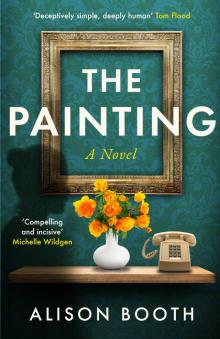 The Painting
The Painting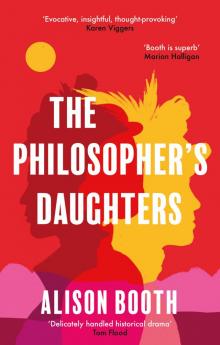 The Philosopher's Daughters
The Philosopher's Daughters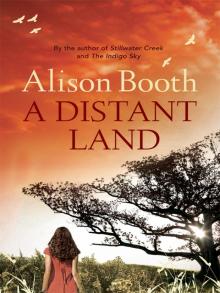 A Distant Land
A Distant Land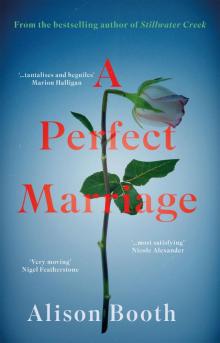 A Perfect Marriage
A Perfect Marriage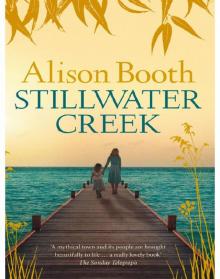 Stillwater Creek
Stillwater Creek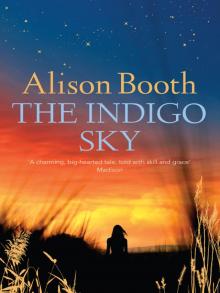 The Indigo Sky
The Indigo Sky